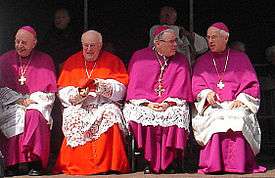Prelate
| Look up prelate in Wiktionary, the free dictionary. |
A prelate is a high-ranking member of the clergy who is an ordinary or who ranks in precedence with ordinaries. The word derives from the Latin prælatus, the past participle of præferre, which means "carry before", "be set above or over" or "prefer"; hence, a prelate is one set over others.
The archetypal prelate is a bishop, whose prelature is his particular church. All other prelates, including the regular prelates such as abbots and major superiors, are based upon this original model of prelacy.
Related terminology
In a general sense, a prelate in the Catholic Church and other Christian churches, is a bishop or other ecclesiastical person having Ordinary authority over a jurisdiction equivalent to a diocese or a similar jurisdiction (e.g. ordinariates, apostolic vicariates/exarchates, territorial abbacies). It equally applies to Cardinals (who enjoy a kind of "co-governance" of the Universal Church as the Pope's most senior ecclesiastical advisors and moral representatives) and certain "Superior Prelates of the Offices of the Roman Curia" who are not bishops, such as the auditors (judges) of the Holy Roman Rota and Protonotaries Apostolic. By extension, it refers to "inferior" or "lesser prelates," i.e. priests having the title and dress of prelates as a personal honorific, i.e. Papal Chaplains, Prelates of Honor (formerly “domestic prelates”) and honorary Protonotaries Apostolic. All these enjoy the title of monsignor (used also for bishops and archbishops, except in English-speaking countries). The seven de numero Protonotaries Apostolic in Rome, who are special papal notaries, are true prelates, like bishops; others, "supernumerary," Protonotaries Apostolic enjoy this as an honorific, like Papal Chaplains and Prelates of Honor.
Prelate, in the strict canonical sense, refers to a priest or bishop who is Ordinary of a Personal Prelature, a functional equivalent of a diocese having a “particular pastoral or missionary work for various regions or for different social groups.” (Cf. c. 294, Code of Canon Law.). At present, the only Personal Prelature in the Catholic Church is that of Opus Dei, founded by St. Josemaria Escriva de Balaguer in 1928 and raised to the status of a personal prelature in 1982. It has no territorial boundaries.
In the Armenian Apostolic (Orthodox) Church, prelate (in English) refers to a diocesan bishop, who has jurisdiction over a diocese, also called a "prelacy."
Territorial prelatures
A territorial prelature is, in Roman Catholic usage, a prelate whose geographic jurisdiction, called territorial prelature, does not belong to any diocese. A territorial prelate is sometimes called a prelate nullius, from the Latin nullius diœceseos, prelate "of no diocese", meaning the territory falls directly under the jurisdiction of the pope and is not a diocese under a residing bishop.[1] As of 2013, there were 44 territorial prelatures, all in the Latin Church.
The term also is used in a generic sense, in which case it may equally refer to an apostolic prefecture, an apostolic vicariate or a territorial abbacy.
Personal prelatures
In the Roman Catholic Church, the personal prelature was conceived during the sessions of the Second Vatican Council (1962 - 1965) in no. 10 of the decree Presbyterorum ordinis and was later enacted into law by Paul VI in his motu proprio Ecclesiae sanctae. The institution was later reaffirmed in the 1983 Code of Canon Law.[2] Such a prelature is an institution having clergy and (possibly) lay members which would carry out specific pastoral activities. The adjective personal refers to the fact that, in contrast with previous canonical use for ecclesiastical institutions, the jurisdiction of the prelate is not linked to a territory but over persons wherever they be. The establishment of personal prelatures is an exercise of the theologically inherent power of self-organization which the Church has to pursue its mission, though a personal prelature is not a particular church as dioceses and military ordinariates are.
Personal prelatures are fundamentally secular organizations operating in the world (members take no vows and live normal, everyday lives), whereas religious institutes are religious organizations operating out of the world (members take vows and lead lives in accordance with their specific organization).
The first (and presently only) personal prelature is Opus Dei, which was elevated to a personal prelature by Pope John Paul II in 1982 through the Apostolic constitution Ut sit. In the case of Opus Dei, the prelate is elected by members of the prelature and confirmed by the Pope, the laity and clergy of the prelature are still under the governance of the particular church where they live, and the laity associated with the prelature (both men and women) are organically united under the jurisdiction of the prelate.
See also
- Catholic Church hierarchy § Equivalents of diocesan bishops in law
- Ordinariate for the faithful of eastern rite
- Personal ordinariate
References
- ↑
 Herbermann, Charles, ed. (1913). "Prelate". Catholic Encyclopedia. New York: Robert Appleton Company.
Herbermann, Charles, ed. (1913). "Prelate". Catholic Encyclopedia. New York: Robert Appleton Company. - ↑ Personal Prelatures cann. 294–297
